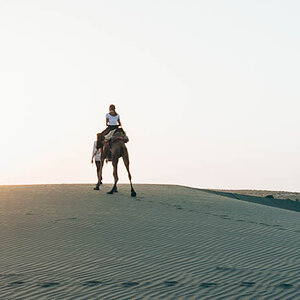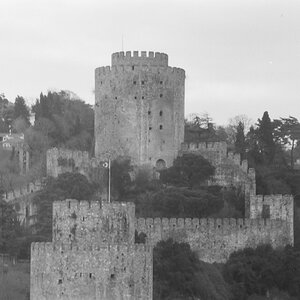skieur
TPF Noob!
- Joined
- May 14, 2007
- Messages
- 5,071
- Reaction score
- 204
- Location
- Canada
- Can others edit my Photos
- Photos OK to edit
Boy, I am amazed at how many photographers cling to the past, which seems to me to be a fatal mistake for any serious photographer or potential pro.
The first group is those that cling to black and white. The only high quality black and white was done by those who did a considerable amount of work on tonal variations, detail, and contrast control in the darkroom. That type of quality represents perhaps 1% of what I have seen. Generally what I have seen is from those who assume that black and white is easier than dealing with all the variations of colour with results that are usually muddy, unnatural, and poor quality. A sub group here is those that selectively colour. When it was a new approach it was interesting, but when it became repetitious and badly done, it became no longer effective and had far less visual impact.
The next group is those that cling to 35mm film. Digital surpassed 35mm film sharpness quality when it surpassed 10 megapixels. The difference I saw in a wedding shoot. The guy using film had excellent shots of my daughter in her white wedding dress. My shots using digital however showed the texture and detail in the dress design missing from the film shots. The immediacy of preview and possible retake makes digital impossible to beat in any photo situation.
Then there are the MANUAL shooters which is a large percentage. Initially it was the way to go, because AUTOMATIC was a very rough estimate of what was needed in adjustments for a particular shot. Any good photographer could do better with manual by recognizing the need for perhaps a faster shutter speed, more depth of field and a higher fstop, and perhaps manual focusing. Technology has changed and the chips and sensors have tremendously improved. Now the manuals even indicate that AUTOMATIC will accurately handle ANY photographic situation and the further scene and picture modes will ensure a perfect photo.
Those photographers who change with the times have realized that AUTOMATIC and MANUAL have been replaced with PRE-PROGRAMMING. The photographer who does scenics for example, sets the fstop for the depth of field that fits his/her style, the ISO that most often balances available light with noise issues, the white balance, contrast, dynamic range, etc. and then records his/her settings on a dial or button. The same technique for portraits, sports shots etc.
The result is faster shooting for the photographer to get the shot and less tweaking in post.
skieur
The first group is those that cling to black and white. The only high quality black and white was done by those who did a considerable amount of work on tonal variations, detail, and contrast control in the darkroom. That type of quality represents perhaps 1% of what I have seen. Generally what I have seen is from those who assume that black and white is easier than dealing with all the variations of colour with results that are usually muddy, unnatural, and poor quality. A sub group here is those that selectively colour. When it was a new approach it was interesting, but when it became repetitious and badly done, it became no longer effective and had far less visual impact.
The next group is those that cling to 35mm film. Digital surpassed 35mm film sharpness quality when it surpassed 10 megapixels. The difference I saw in a wedding shoot. The guy using film had excellent shots of my daughter in her white wedding dress. My shots using digital however showed the texture and detail in the dress design missing from the film shots. The immediacy of preview and possible retake makes digital impossible to beat in any photo situation.
Then there are the MANUAL shooters which is a large percentage. Initially it was the way to go, because AUTOMATIC was a very rough estimate of what was needed in adjustments for a particular shot. Any good photographer could do better with manual by recognizing the need for perhaps a faster shutter speed, more depth of field and a higher fstop, and perhaps manual focusing. Technology has changed and the chips and sensors have tremendously improved. Now the manuals even indicate that AUTOMATIC will accurately handle ANY photographic situation and the further scene and picture modes will ensure a perfect photo.
Those photographers who change with the times have realized that AUTOMATIC and MANUAL have been replaced with PRE-PROGRAMMING. The photographer who does scenics for example, sets the fstop for the depth of field that fits his/her style, the ISO that most often balances available light with noise issues, the white balance, contrast, dynamic range, etc. and then records his/her settings on a dial or button. The same technique for portraits, sports shots etc.
The result is faster shooting for the photographer to get the shot and less tweaking in post.
skieur






![[No title]](/data/xfmg/thumbnail/42/42474-aa3cf1f7163a823d6f10558b262a4bc3.jpg?1619740194)






![[No title]](/data/xfmg/thumbnail/37/37488-1946adf246ec6e047915c668d3dcff15.jpg?1619738111)

